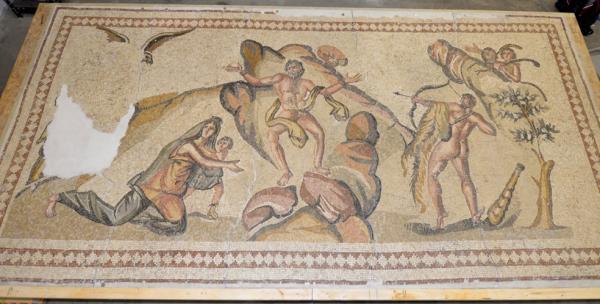Yassin Alcharihi, a 56-year-old man living in Southern California, is on trial for allegedly smuggling an ancient Roman mosaic into the United States. The Justice Department believes the mosaic was looted from Syria during the country’s civil war.
Alcharihi was charged in 2020 with lying about the contents of a shipment of objects he received from Turkey in 2015, claiming the mosaic in question was only worth $587 when its real value was in the range of hundreds of thousands of dollars.
The FBI seized the 18-foot mosaic in 2016 from Alcharihi’s residence in Palmdale, California, and expert assessment of the piece determined that it was a product of the Byzantine Period, depicting Hercules in a style consistent with cultural output of the time from the region that is now Syria.
The prosecution maintains that Alcharihi received a text message from a Syrian colleague with a photo of the mosaic in 2015; the two purchased a variety of new vases and mosaics and had them shipped alongside the ancient artefact to the US. The US Attorney’s office in Los Angeles filed a forfeiture complaint to retrieve the mosaic in 2018, citing the “smuggling [of] looted items believed to be from a foreign conflict area into the United States”.
Ashley Mahmoudian, Alcharihi’s public defender, told jurors in her opening statement this week that the “mosaic is fake”, Courthouse News reported. According to his lawyer, Alcharihi claimed that it was imported “as trash”, and that he believed it was a “Turkish mosaic”. The defense characterised Alcharihi as relying on an inexperienced customs broker whose documentation left much to be desired. Shipment paperwork maintained that the items in the original haul were worth $2,200. Alcharihi later admitted he paid $12,000 for the lot.
Randall Hixenbaugh, a New York-based dealer in ancient art brought in by the defense to provide an assessment of the mosaic’s authenticity, suggested it may not be genuine. He pointed to the presence of a female figure wearing pants as a suspicious detail—telling the court that it is “a symbol of male barbarism to wear trousers” in ancient Greek and Roman art, according to Courthouse News—and estimated the mural’s value at $30,000.
The prosecution, on the other hand, alleges that Alcharihi’s digital correspondence will prove that he was aware of the true worth and authenticity status of the mosaic. A government expert will testify that the materials comprising the mosaic hail from the Eastern Mediterranean, and that the artefact is, indeed, 2,000 years old.
The Idlib region of Syria, where the mosaic is believed to have been created, has been undergoing conflict between rebel and jihadist groups and the Syrian government since 2011. The US placed restrictions on the import of archaeological material in order to protect Syria’s cultural heritage. “The appearance in the United States of stolen or illegally exported artefacts from other countries where there has been pillage has, on occasion, strained our foreign and cultural relations,” a US Customs and Border Protection spokesperson said in a 2020 statement. “This situation, combined with the concerns of museum, archaeological and scholarly communities, was recognised by the President and Congress.”

























